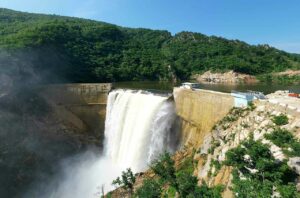On April 29, 2021, the Stimson Center and the Konrad-Adenauer-Stiftung (KAS) held the third iteration of their exclusive Joint Working Group (JWG) series—launched last year—on EU’s water diplomacy with respect to the three most water-stressed regions in the world: the Himalayas, Central Asia and the Euphrates-Tigris (E-T) basin in the Middle East. The latest convening of the JWG was devoted to the E-T, a lifeline for the four countries—Turkey, Iraq, Syria, and Iran—that rely on its waters for household consumption, irrigation, and power generation. The E-T over the years has experienced high water stress and environmental degradation leading to increased water scarcity in the three core riparian states, Turkey, Syria, and Iraq. The future of the basin stands in need for robust cooperative approaches to develop equitable and sustainable water use policies for all parties involved.
The JWG session brought together high-level experts from Turkey and Iraq along with representatives of the EU Member States as well as international think tanks to jointly assess the overall challenges which have cumbered efficient water allocation among riparian states. The group also reflected upon EU’s possible role in facilitating capacity building, knowledge sharing, and greater cooperation over transboundary river governance in the region.
Decades-long negotiations yet an absence of shared water management frameworks
Experts shared that overall regional political insecurity and social instability has exceedingly made cooperation on transboundary river courses arduous. The existing challenges have further been compounded by lack of institutional responses and insufficient regulations, both domestically and regionally. Climate change was discussed, in depth, as a threat multiplier which is poised to create additional civic and diplomatic tensions in the region. The recurring droughts, rising temperatures, and dwindling water resources emphasize the exigency with which governments should address the overlapping repercussions of climate change, not just at the national level but also regionally.
While discussing the absence of cooperative mechanisms and tangible outcomes on transboundary water management between the upstream Turkey and downstream Iraq and Syria, an expert flagged that the decades-long effort to develop greater discourse between these states have largely been rhetorical with considerable back and forth on “promises” and other agreed upon protocols—it’s time to move beyond these cyclical attempts and towards creating actual impact. Water is largely securitized and there remains a void in terms of concrete and legally abiding set of basin-wide agreements which would also take into consideration an integrated water resource management approach considering the socio-economic significance of the watercourses. In recent years, discourse on the E-T has also been limited to Turkey and Iraq minus Syria mainly due to the latter’s volatile security situation. Iran, the “hidden” riparian, as dubbed by an expert, mostly chooses to work independently and has not been party to any joint water discussions yet. Looking ahead it may be important to have Iran join regional or basin-wide dialogues to ensure that all riparian states work in tandem in employing more benefit-sharing notions.
Drawing parallels between the E-T and other water-stressed regions with transboundary rivers, an expert pointed out the convoluted relationship between China and its downstream neighbors, India and Bangladesh, over the Yarlung Tsangpo/Brahmaputra River. China’s dam-building, in the absence of a formal water sharing agreement, has been a source of grave concern as these interventions are expected to reduce water flows downstream and cause ecological degradation overtime. Similarly, since 1975, Turkey’s own hydropower ambitions and massive irrigation activities upstream have reportedly hampered both the quantity and quality of water flowing into Iraq and Syria. Iraq’s exacerbating water crisis, dire economic conditions, and rising populations mean that the country cannot afford to surrender the river flow in the Tigris, Euphrates and Shatt Al-Arab rivers. All these ingredients together serve as catalysts for continued strained relations and future conflicts. However, an expert pointed out that from an upstream perspective, the Iraq’s water demands are “too big” to cater to given the volumes of water currently in the E-T rivers. There is also another argument regarding Iraq’s own inefficiency in managing the available water resources that may have added to the country’s water woes.
Reflecting on the EU’s potential role in the region, experts drew attention to Turkey’s stance against a third-party solicitor or an external player in the affairs of the E-T basin whether in terms of technical assistance, capacity-building or legal interventions. As such, any attempt by the EU to facilitate basin-wide dialogues may encounter considerable backlash from upstream countries like Turkey. On the contrary, such international interventions would be perceived more positively by Iraq and Syria who welcome outside assistance if it ensures equitable water access which is essential to support their post-conflict recovery.
Changing the narrative: a possible way forward?
Despite attempts at cooperation and frequent exchange of water experts as mentioned above, particularly between Turkey and Iraq, the existing water sharing protocols and Memorandums of Understandings (MoUs) have failed to fully encapsulate and address the multifaceted political, security, and socio-economic issues tied to the E-T basin. Nonetheless, experts shared their optimism for the E-T basin; they expressed the need for changing the narrative from competition and overpowering nationalism to greater cohesion and cooperation. Even though Turkey and Iran have leverage as upstream riparian states, they stand in concurrence with Iraq and Syria on the projected negative environmental impacts in the region. Hence it is in there their interest to work together to mitigate the climate and water security threats to ensure long-term food and economic stability. In fact, an expert highlighted that mapping climate security risks could be a potential entry point for all riparian states to coordinate efforts. Additionally, Iraq and Syria can also learn by the example of lower Mekong countries on how to collaborate with one another and incentivize upstream countries to embrace mutually beneficial solutions.
In the future, The Stimson Center and KAS will continue their joint efforts in mobilizing and engaging key stakeholders to address the mounting water and environmental challenges in the Global South.



